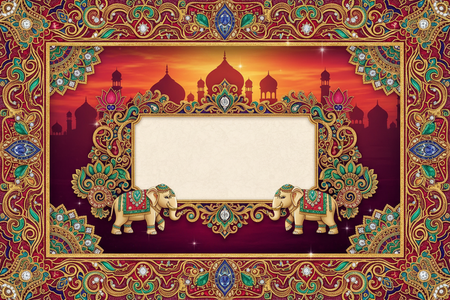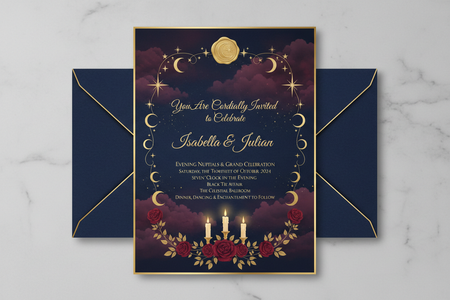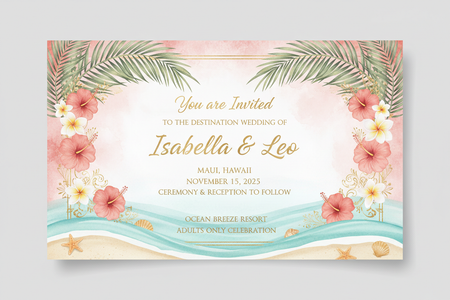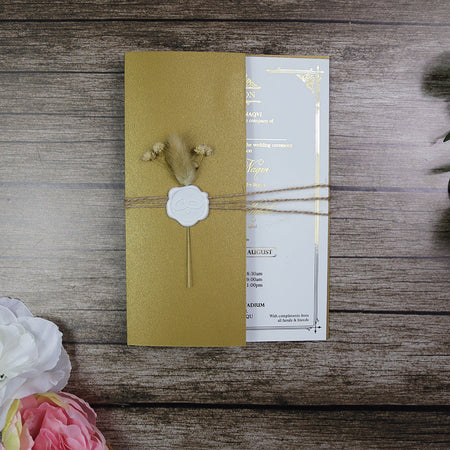If you’ve been invited to your first Muslim wedding in the UK, congratulations—you're about to experience a beautiful celebration full of spiritual meaning, cultural traditions, and community warmth.
At ShadiCards.com, we’ve helped thousands of couples craft the perfect wedding invitations for their Muslim Nikah and Walima ceremonies. So we know just how unique each wedding can be—especially when faith, family, and diverse backgrounds meet.
This guide will walk you through what to expect, including ceremonies, etiquette, dress code, and gift ideas, to ensure you attend with confidence and respect.
What is a Muslim Wedding?
A Muslim wedding is a religious and legal union based on Islamic principles, centered around the Nikah—the official marriage contract. Muslim weddings in the UK are often a mix of faith-based practices and cultural customs from countries like Pakistan, Bangladesh, India, Somalia, the Middle East, and North Africa.
Depending on the family’s background, the celebration may include a variety of events over several days.
Key Ceremonies at a Muslim Wedding
1. Nikah (The Marriage Contract)
This is the central religious ceremony where the bride and groom are officially married under Islamic law. It can take place at a mosque, the bride’s home, or a wedding venue.
-
It includes a Khutbah (sermon) by an imam or scholar.
-
The couple signs the Nikah-nama (marriage contract).
-
Mehr (a mandatory gift from the groom to the bride) is agreed upon and recorded.
-
The bride and groom may sit in the same room or separate areas, depending on cultural preference.
Typical invitation wording:
"With the blessings of Allah (SWT), we request the pleasure of your company at the Nikah ceremony of..."
2. Walima (The Reception)
This is the groom’s celebration after the Nikah, usually a large, formal event hosted in a banquet hall. It’s open to extended family, friends, and the wider community.
-
Formal speeches, dinner, and sometimes light entertainment.
-
Modest dress and segregated seating (in some communities) are common.
-
Less religious than the Nikah, more social in nature.
3. Other Possible Events
While not part of Islamic requirements, many Muslim families incorporate cultural pre-wedding events such as:
-
Mehndi/Henna Night: Often for the bride, full of music, dancing, and henna application.
-
Dholki: A Pakistani tradition with drumming and singing.
-
Rukhsati: Emotional farewell when the bride leaves her home.
-
Barat: Groom’s formal arrival, celebrated with music and ceremony.
Dress Code at a Muslim Wedding in the UK
Dress modestly and elegantly. Here's what to keep in mind:
For Women:
-
Cover shoulders, cleavage, and ideally knees.
-
Avoid sheer or tight-fitting outfits.
-
A scarf or dupatta isn’t always required but is respectful, especially in a mosque.
-
Popular choices: Sarees, abayas, lehengas, maxi dresses, or shalwar kameez.
For Men:
-
Smart traditional wear like kurtas, or Western suits.
-
Avoid shorts or overly casual outfits.
-
In some cases, a cap or hat (topi) may be worn inside mosques.
Tip: Check the invitation for any dress code or “modest attire requested” notes.
Food at a Muslim Wedding
Expect a feast! Muslim weddings typically serve halal food, which means meat is prepared according to Islamic dietary rules.
-
Popular dishes include biryani, kebabs, samosas, and curries.
-
No alcohol is served at practicing Muslim weddings.
-
Dessert tables are usually elaborate with mithai (sweets) and cakes.
Always check the invite for dietary instructions or restrictions.
Do You Bring Gifts?
Yes, gifts are welcomed but not obligatory.
Gift Ideas:
-
Cash envelopes (very common, especially in South Asian weddings).
-
Islamic books or décor items.
-
Home goods or kitchenware.
-
Gift cards or custom artwork.
Some couples include a QR code linking to a gift registry or monetary contribution option—especially for destination weddings or online RSVPs.
Wedding Invitations: What to Look For
Muslim wedding invitations often include:
-
Bismillah (In the name of Allah) at the top
-
Arabic or Urdu text with English translation
-
Mention of Nikah and Walima separately
-
Dress code and seating arrangement (mixed or segregated)
-
QR code for RSVP or directions
At ShadiCards.com, we offer a wide range of modern, traditional, digital, and luxury Muslim wedding invitations that honour both faith and personal style.
Etiquette for Attendees
-
Arrive on time: The Nikah can start promptly, especially at the mosque.
-
Remove shoes if the ceremony is in a mosque or on prayer mats.
-
Greet respectfully with "As-salamu alaykum" (peace be upon you).
-
Gender segregation: Some events have separate seating or entrances for men and women.
-
Photography: Always ask before taking pictures, especially of women or inside mosques.
Cultural Variations You Might See
Muslim weddings are not one-size-fits-all. Here’s how traditions might vary:
| Culture | Unique Elements |
|---|---|
| Pakistani | Barat, Mehndi, Rukhsati, family honour elements |
| Bangladeshi | Paka Dekha (engagement), Holud ceremony, colourful décor |
| Indian Muslim | Nikah followed by elaborate Walima and traditional dress |
| Arab | Zaffa (entrance parade), gold jewellery, oud incense |
| African | Kufi hats, African prints, traditional drumming |
| Western | More simplified events, sometimes fused with civil vows |
Final Thoughts
A Muslim wedding in the UK is a wonderful mix of religious tradition, family unity, and cultural richness. Whether you're attending as a friend, colleague, or extended relative, being aware of the customs, dress codes, and ceremonies will help you enjoy the celebration with grace and respect.
And if you’re the couple planning your special day, don’t forget—the invitation sets the tone.
💌 Explore Muslim Wedding Invitations at ShadiCards.com
From elegant Nikah cards to regal Walima invitations, we offer fully personalised designs tailored to Pakistani, Bangladeshi, Indian, and British Muslim weddings.
✅ Bismillah Designs
✅ Arabic Calligraphy
✅ QR Code RSVPs
✅ Boxed, Scroll, and Eco Options
✅ Digital + Physical Sets Available






